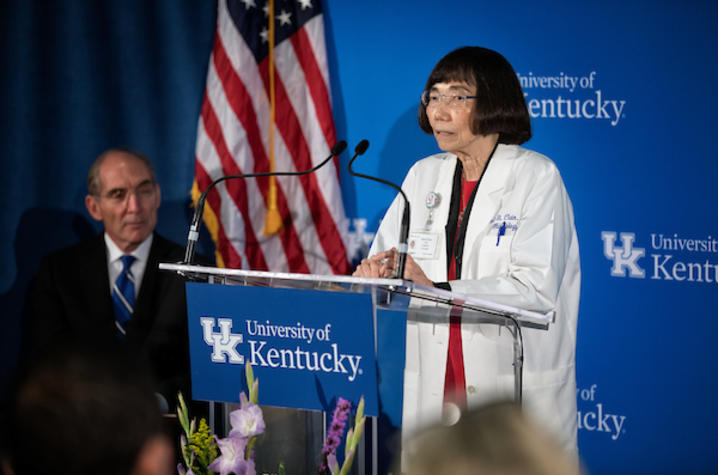Daret St. Clair Receives Lifetime Achievement Award from International Society
University of Kentucky Markey Cancer Center researcher Daret St. Clair, Ph.D., has been named the 2018 Lifetime Achievement Award Recipient from the Society for Redox Biology and Medicine (SfRBM). St. Clair received the award and gave a feature lecture at the SfRBM’s 25th Annual Conference in Chicago earlier this month.
St. Clair's career is marked by her seminal work on the role of manganese superoxide dismutase (MnSOD) in cancer development and therapy. Her research has resolved long-debated questions about MnSOD expression in cancer and has demonstrated that the presence of MnSOD inversely regulates the induction and progression of cancer.
Her investigations of the mechanisms mediating the unique role of MnSOD are fundamental contributions to the recognition that cancer cells are under higher oxidative stress than their normal cell counterparts. Her studies have elevated the redox biology field to its stature as an important component of cancer research.
“Dr. St. Clair’s groundbreaking work in cancer research, and her dedication to finding answers to help the millions of people around the globe diagnosed with this disease, shows why she stands as a preeminent example for not only women in science but all scientists,” said SfRBM President Dr. Phyllis A. Dennery, Sylvia Kay Hassenfeld Professor of Pediatrics
Chair, Department of Pediatrics and Professor of Cell Biology, Molecular Biology and Biochemistry, Warren Alpert Medical School of Brown University. “No one is more deserving of this prestigious recognition, than my friend and colleague Daret.”
St. Clair began her career at UK as an assistant professor in 1991. She was promoted to full professor in 1999; and since 2002, she has held UK’s James Graham Brown FoundationEndowed Chair. She has served as the associate director for basic research at Markey for nearly 10 years, and last year became the director of the UK Center for Excellence in Cancer and Metabolism.
Dr. St. Clair's current focus is on the long-term side effects of cancer treatment that not only significantly impair the quality of life of survivors but have serious implications for cancer recurrence and prohibitive long-term healthcare costs. Her aspiration is that the results from extensive proof-of-concept studies will galvanize further developments of novel redox-based therapeutic agents for clinical applications and will have a groundbreaking impact on future drug design and clinical practice.
